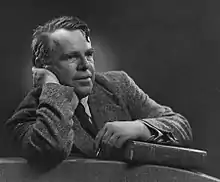Claude-Henri Grignon
Claude-Henri Grignon (July 8, 1894 – April 3, 1976)[1] was a French-Canadian novelist, journalist and politician, best known for his 1933 novel Un Homme et son péché.[2]
Claude-Henri Grignon | |
|---|---|
 | |
| Born | July 8, 1894 Sainte-Adèle, Quebec, Canada |
| Died | April 3, 1976 (aged 81) Sainte-Adèle, Quebec, Canada |
| Occupation | novelist, critic, radio and television writer |
| Nationality | Canadian |
| Period | 1920s-1960s |
| Notable works | Le Secret de Lindbergh, Un Homme et son péché, Les Belles Histoires des pays d'en haut |
Early life
Grignon was born in Sainte-Adèle, Quebec. He was a cousin of writer Germaine Guèvremont.[3]
Career
Grignon began working as a journalist in 1916, writing for a number of publications in Quebec, including La Minerve, Le Matin, Le Canada, Le Petit Journal, La Revue populaire, La Renaissance and Bataille. He published his debut novel, Le Secret de Lindbergh, in 1929. His second novel, Un Homme et son péché, was published in 1933. A tale of a man whose greed leads to the death of his wife, the book broke with Quebec's literary conventions of the time by satirizing rather than glorifying life in rural Quebec, and came to be recognized as one of Quebec's early modernist novels.[4][1] By contrast, Guèvremont's novels in the same period continued to follow Quebec's more traditionalist romans du terroir style.[3]
Grignon released the short story collection Le Déserteur et autres récits de la terre in 1934. As well, he wrote literary and political criticism, including Les Vivants et les autres and Ombres et Clameurs. In his work Les Pamphlets de Valdombre, a trenchant satire of the government of Maurice Duplessis,[5] Grignon advanced the theory that publisher and literary critic Louis Dantin was the real author of the poetry of Émile Nelligan;[6] although the claim was widely derided and denied by Dantin himself, it was later readvanced by literary historian Yvette Francoli in her 2013 book Le naufragé du Vaisseau d'or.
He subsequently wrote a serial radio dramatization of Un Homme et son péché,[7] as well as the television adaptation Les Belles Histoires des pays d'en haut. The novel has also been adapted as a film three times, including 1949's A Man and His Sin and 2002's Séraphin: Heart of Stone (Séraphin: un homme et son péché).[8]
Grignon later served as mayor of Sainte-Adèle from 1941 to 1951. For a time he was the literary editor of the Clarion-Montréal newspaper.[9]
Grignon's papers have been collected and preserved at the Bibliothèque et Archives nationales du Québec.[10]
Works
- 1922 - Les Vivants et les autres
- 1929 - Le Secret de Lindbergh
- 1933 - Ombres et Clameurs
- 1933 - Un homme et son péché
- 1934 - Le Déserteur et autres récits de la terre
- 1935 - Précisions sur « Un homme et son péché »
- 1936 - Les Pamphlets de Valdombre
References
- Claude-Henri Grignon at The Canadian Encyclopedia.
- Daniel Chartier (2000). "1". L'émergence des classiques: la réception de la littérature québécoise des années 1930. Les Editions Fides. p. 57. ISBN 978-2-7621-2174-2.
- French Canadian Writers: Germaine Guèvremont Archived 2010-04-04 at the Wayback Machine at Athabasca University Centre for Language and Literature.
- Reingard M. Nischik (2008). History of Literature in Canada: English-Canadian and French-Canadian. Camden House. p. 245. ISBN 978-1-57113-359-5.
- William H. New, The Encyclopedia of Literature in Canada. ISBN 0-8020-0761-9.
- Gaëtan Dostie, "Nelligan et de Bussières créés par Dantin ?". Le Patriote. Republished by the Saint-Jean-Baptiste Society of Montreal, July 22, 2015.
- George Melnyk (2004). One Hundred Years of Canadian Cinema. University of Toronto Press. p. 81. ISBN 978-0-8020-8444-6.
- "Claude-Henri Grignon avait-il tout faux?" Le Journal de Montreal, Guy Fournier, 22 December 2015
- Frank Guttman (24 May 2007). The Devil from Saint-Hyacinthe: Senator Týlesphore-Damien Bouchard. iUniverse. p. 198. ISBN 978-0-595-84678-8.
- John Robert Colombo (1 January 1984). Canadian Literary Landmarks. Dundurn. p. 65. ISBN 978-0-88882-073-0.